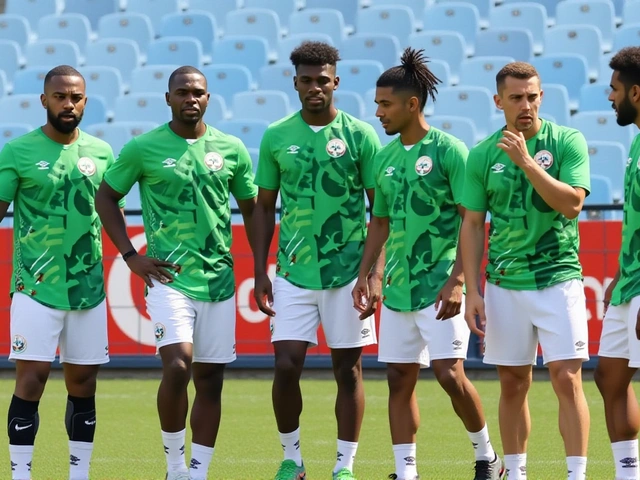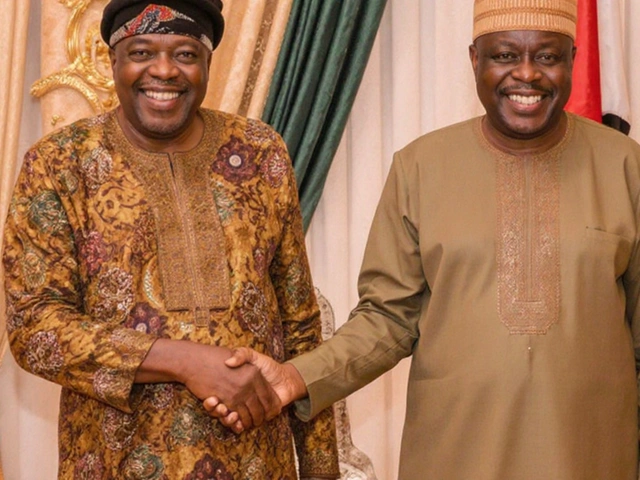When Luhaga Mpina stepped out of his home in Dar es Salaam on October 28, 2025, he knew he wouldn’t be voting for himself the next day. Not because he didn’t want to — but because the state had made sure he couldn’t. The Independent National Electoral Commission (INEC) had barred him twice from running for president, overturning a High Court ruling in a move that stunned even seasoned observers. By the time Tanzania went to the polls on the October 29, 2025 presidential electionTanzania, the field was empty of real competition. And the winner — Samia Suluhu Hassan — claimed 97.66% of the vote, with 31.9 million ballots out of 32.7 million cast. It wasn’t just a landslide. It was a silence dressed in numbers.
How Tanzania’s Opposition Vanished
It didn’t happen overnight. The erosion began in April 2025, when Chadema, Tanzania’s largest opposition party, was disqualified for missing a deadline to sign the government’s electoral code of conduct. Their leader, Tundu Lissu, had spent months rallying citizens under the banner “No Reform, No Elections,” demanding independent oversight of the ballot. On April 9, 2025, police arrested him after a rally turned violent. He’s been in prison since, facing treason charges that carry the death penalty. His crime? Speaking truth to power in a country where dissent is increasingly treated as sedition.Then came Mpina. A former ruling party member who defected to ACT-Wazalendo, Tanzania’s second-largest opposition force, he was initially disqualified by INEC on August 27, 2025, over alleged procedural flaws in his nomination. ACT-Wazalendo took the case to court — and won. On September 11, the High Court ordered his reinstatement. But four days later, INEC barred him again — this time citing a complaint from the Attorney General’s Office that Mpina lacked proper party endorsement. The same office that had once backed him as a CCM member now painted him as a rogue candidate. No evidence was made public. No hearing was held. Just a rubber-stamp order.
The Courtroom That Couldn’t Save Him
Mpina’s legal team filed a second challenge, with hearings set for early October. But the clock was ticking. The electoral commission didn’t wait. On October 18, 2025 — eleven days before voting — INEC confirmed Mpina’s exclusion, citing “finality of administrative decisions.” Legal experts called it a farce. “The court’s ruling was binding,” said Dr. Amina Mwakasungura, a constitutional lawyer at the University of Dar es Salaam. “But when the state doesn’t respect judicial authority, the law becomes a suggestion.”Meanwhile, Chadema’s disqualification meant no candidate from the party could appear on the ballot. Their 2020 vote share — nearly 17% — simply vanished. ACT-Wazalendo, which had polled 12% in 2020, was left without its strongest candidate. The result? A field of 17 candidates, most of them obscure independents or minor party figures with no national reach. President Hassan faced no credible challenger. Not because voters didn’t want one — but because the system had removed them all.
97.66%: A Number That Doesn’t Add Up
The official results, announced on October 30, 2025, were absurd on their face. Hassan won 31.9 million votes. The next closest candidate received 512,000. Turnout was reported at 97.5% — higher than in any previous Tanzanian election. But international observers, including the African Union, were barred from monitoring the vote. Only domestic “observers,” many of whom were government appointees, were allowed in. Chadema, still banned from participating, released a statement on X (formerly Twitter): “This is not an election. It is an open coup against the will of Tanzanians who have been denied their democratic right to choose the leader they want.”And the numbers? They don’t reflect reality. In 2020, Hassan won 58% in her first full election. In 2015, the ruling CCM won 58.4%. Even under Magufuli’s most repressive years, opposition parties still drew millions. Here, with two major parties erased and their leaders jailed or barred, 97.66% is not a mandate — it’s a mathematical fiction. The ballots were there. The people? Not really.
Who Benefits? And Who’s Next?
President Hassan’s inner circle is tightening. Her son-in-law, Mohamed Mchengerwa, and her son, Abdul Halim Hafidh Ameir, are rumored to be orchestrating the crackdown on dissent. Vice-President Emmanuel Nchimbi, her running mate, is already shaping policy. And the old guard — allies of former President Jakaya Kikwete — are expected to return to Cabinet positions. Hussein Bashe and Innocent Bashungwa, both former ministers, are rumored to be in line for key portfolios.But the cost is steep. Tanzania’s reputation as a stable democracy in East Africa is in tatters. The World Bank has paused new funding for governance programs. The EU has issued a formal warning. And young Tanzanians? Many are quietly leaving. “I used to believe in voting,” said 24-year-old university student Aisha Mwakio, who recently moved to Kenya. “Now I believe in survival.”
What Happens Now?
The next four years will be defined by silence. Hassan will govern without opposition. No parliamentary scrutiny. No public rallies. No independent media. The few journalists who dare to ask questions are being summoned for “informal chats” with state security. The courts? They’re still open — but only for those who don’t challenge the state.ACT-Wazalendo is still fighting. Mpina’s legal team plans to appeal to the Court of Appeal. But time is short. The inauguration is scheduled for November 5, 2025. By then, the new Cabinet will be sworn in. The damage will be done.
There’s a chilling parallel here. In 2017, Lissu survived 16 bullet wounds in an assassination attempt. He was told he’d never walk again. He didn’t just walk — he led a movement. Now he’s in prison, facing death. And Mpina? He’s been told he can’t run. But the question isn’t whether he’ll run again. It’s whether anyone will be left to vote for him.
Frequently Asked Questions
Why was Luhaga Mpina disqualified twice?
Mpina was first disqualified by INEC on August 27, 2025, over alleged flaws in ACT-Wazalendo’s nomination process. After the High Court overturned the ban on September 11, INEC reversed course again on September 15, citing a complaint from the Attorney General’s Office claiming he lacked proper party endorsement. No evidence was made public, and the second disqualification ignored the court’s binding ruling — signaling state control over judicial outcomes.
What happened to Tundu Lissu and Chadema?
Chadema was banned from contesting the 2025 election in April after refusing to sign the government’s electoral code without reforms. Its leader, Tundu Lissu, was arrested on April 9, 2025, and now faces treason charges carrying the death penalty. His crime: publicly demanding electoral integrity. Chadema’s disqualification removed Tanzania’s most organized opposition force, leaving no credible challenger to President Hassan.
How credible is the 97.66% vote result?
The result is widely viewed as implausible. In 2020, Hassan won 58% with a competitive field. In 2025, with both Chadema and ACT-Wazalendo’s top candidate barred, 97.66% defies historical patterns. International observers were barred, and domestic monitors were state-aligned. The turnout of 97.5% is also suspicious — higher than any previous election — suggesting ballot manipulation or forced participation.
Is there any legal recourse left for the opposition?
Mpina’s legal team plans to appeal to the Court of Appeal, but the window is narrow — inauguration is on November 5. Chadema, still banned, cannot legally challenge the results. The judiciary, while technically independent, has shown no willingness to confront the executive. Without international pressure or mass protests, legal avenues are likely to be blocked or ignored.
What does this mean for Tanzania’s democracy?
Tanzania has effectively become a one-party state in practice, even if not in name. With both major opposition parties dismantled and their leaders jailed or barred, democratic competition has been extinguished. The ruling CCM now controls every branch of government. The next four years will likely see further erosion of press freedom, civil society, and judicial independence — turning Tanzania into a cautionary tale for the region.







Narinder K
So let me get this straight - 97.66%? In a country where people still argue over who stole the last samosa at a family wedding? That’s not an election, that’s a spreadsheet written by someone who failed math and got promoted.
Narayana Murthy Dasara
I know it’s easy to feel hopeless when the system’s rigged, but real change doesn’t always happen in the spotlight. It happens in quiet kitchens, in whispered conversations between neighbors, in students swapping books banned by the state. The vote may be stolen, but the idea of freedom? That’s harder to arrest.
Debsmita Santra
The structural erasure of opposition isn’t just about electoral fraud it’s about the systematic dismantling of civic imagination. When you remove the possibility of credible dissent you don’t just silence voices you extinguish the very framework that allows a society to self-correct. The judiciary’s complicity here isn’t accidental it’s engineered. And the normalization of this? That’s the real tragedy. No one’s screaming anymore because they’ve been taught to believe the scream itself is the crime.
Bhavesh Makwana
Look, I’m not naive. I’ve seen this script before in other places. But what’s haunting is how quiet it all is. No riots. No mass protests. Just people turning off the news, closing their doors, and pretending the numbers aren’t fake. Maybe that’s the most dangerous part - we’ve learned to survive by not seeing.
Abhinav Rawat
There’s a strange poetry in how they did this. Not with tanks or curfews, but with forms and deadlines and legal technicalities. They turned democracy into a bureaucratic maze where the exit signs were painted over with ink from the same pen that wrote the rules. Mpina didn’t lose because he was unpopular - he lost because the system decided his name was no longer allowed to appear on the page. And now we’re supposed to applaud the efficiency?
Vasudha Kamra
It’s not just about the vote count. It’s about the precedent. If a court ruling can be overturned by a memo from the attorney general’s office, then the constitution is just a decorative document. And when institutions stop functioning as checks, they become tools. That’s when authoritarianism stops being a threat and starts being the default.
Vidushi Wahal
I read this and just sat there. No tears. No rage. Just… emptiness. Like watching a house burn down and realizing you forgot to call the fire department because you thought someone else already did.
Manoj Rao
97.66%? That’s not a number - it’s a ritual. The state doesn’t even bother hiding the charade anymore. They’ve moved past propaganda into liturgy. The ballot isn’t a choice - it’s a sacrament. You don’t vote for Hassan - you affirm the divine order. The silence isn’t fear - it’s worship. And the ones who left? They didn’t flee. They were excommunicated.
Sabir Malik
I know it’s easy to feel like nothing matters when the system’s rigged, but I’ve seen people rise from worse. My uncle was jailed in the 80s for writing a poem. He came out with nothing but a limp and a notebook full of verses. He taught me that silence isn’t surrender - it’s preparation. The ballot may be stolen, but the story? That’s still ours to write. One letter at a time. One whispered truth at a time. Don’t let them steal your voice - just don’t give it to them in the first place.
lakshmi shyam
You people are pathetic. You sit there crying about democracy like it’s some sacred thing. Who gave you the right to demand it? You didn’t build it. You didn’t earn it. You just expected it like a free meal. This is Africa. This is how it works. Stop whining and learn to bow.